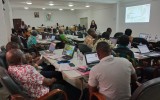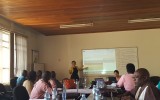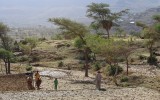News items
Showing items 16 to 30 of 39
View Categories
- Areas of expertise
- Capacity building
- Climate change
- Data
- Disasters and emergencies
- Famine prevention and food security
- Gender
- Income diversification
- Inequality
- Lake Victoria fisheries
- Livelihood resilience
- Livelihood Zones
- Livelihoods
- Monitoring and evaluation
- Nutrition and health
- Open source
- Policy and programme design
- Post-conflict
- Poverty research
- Refugees and displacement
- Social protection
- Technology
- Urban
- Vulnerability assessment
- Countries
- Hydromet
- Methods
- Resilience
- The organisation
-
Interdisciplinary capacity building with the Walker Academy
Evidence for Development is working in partnership with the Walker Academy to develop a range of interdisciplinary on-line training courses, focusing on the impact climate change on society, and was closely involved in the design and delivery of the Academy’s most recent course, a 5-day online training, Climate Resilience Evidence Synthesis Training (CREST) . CREST […]
-
Supporting interdisciplinary PhDs
Evidence for Development supports a number of interdisciplinary PhD students, whose work benefits from the use of quantitative household economy measurement and modelling. Our support includes supervision, training and development. Wolf Ellis: Case studentship, EfD and King’s College London Wolf, who is a former research officer at EfD, has progressed to the analytical and writing-up […]
-
Minimising flood impacts in Uganda: NIMFRU project update
The NIMFRU project is bringing together data from multiple sources to better prepare communities and local disaster response agencies for flood events in Uganda. Currently work is taking place in the Katakwi district, where HEA and IHM baseline studies have recently been completed. Community engagement activities have provided farmers with detailed seasonal weather forecasts and […]
-
Adaptive Social Protection training in Ghana
Building on the initial interdisciplinary ASPIRE training in Dakar (April 2019) a further training for Met services, hydrology departments and other agencies involved in livelihood analysis and social protection took place in Accra in January 2020. The workshop was co-hosted by Ghana’s National Disaster Management Organisation run and led by the Walker Institute with EfD. […]
-
COP25, Madrid
COP25, the UNFCCC Conference of Parties, took place in Madrid this year. Celia Petty attended the important annual conference during week 2 of the negotiations on behalf of the Walker Institute. Alongside the political negotiations at COP, side events run by the Observer community (including UN agencies, NGOs and IGOs) provide valuable insights into current trends, projects […]
-
Evidence for Development co-supervising new research student
We are pleased to be supporting new PhD research which is investigating impact-based early warning systems in Uganda. EfD’s Celia Petty is co-supervising Faith Mitheu, a Kenya-based student, who has recently started work on her PhD: “A model for impact-based flood early warning in Uganda: linking data on hazard, vulnerability and exposure to develop impact-based […]
-
Importance of livelihood information in supporting policy decisions and targeting assistance: stakeholder meetings in Kampala
Last week, Evidence for Development’s John Seaman, Celia Petty and Dai Clegg attended the final HyCRISTAL AGM in Kampala. During the meeting, EfD Senior Associate James Acidri (MP) gave the keynote speech in which he stressed the fact that climate change was already affecting the lives of millions of Ugandans and underlined the importance of […]
-
Adaptive Social Protection training in Senegal
Evidence for Development are delighted to have co-organised Adaptive Social Protection training in Senegal with the Walker Institute as part of the ASPIRE programme. ASPIRE is a DFID/World Bank Adaptive Social Protection project in the Sahel. The aim of this training, which took place at the end of last month, was to facilitate dialogue between […]
-
New PhD opportunity: Data synthesis and integration for improved climate impact assessment
Torn between furthering your career by doing a PhD, and making a difference? You don’t need to be: “Data synthesis and integration for improved climate impact assessment” is a funded PhD co-supervised by Evidence for Development through the SCENARIO Doctoral Training Partnership. This project has the potential to have a big influence in terms of the new […]
-
Improving understanding of the livelihood impacts of flooding in Uganda
Evidence for Development is delighted be involved as a research and training partner in an important new project: NIMFRU – National-scale Impact-based forecasting of Flood Risk in Uganda.
-
Evidence for Development at Adaptation Futures 2018
Evidence for Development were pleased to attend the Adaptation Futures conference in Cape Town this week for the first time. Adaptation Futures is a major international bi-annual event which brings together communities of professionals interested in climate change adaptation.
-
CSAT student showcase
The students who took part in in the Climate Services Academy and Training (CSAT) programme EfD was involved in developing with the Walker Institute earlier in the year, presented work from their overseas placements at a showcase event at the University of Reading today.
-
Rural livelihoods data collection in Homa Bay, Kenya
Over the last few weeks, Household Economy Approach (HEA) and Individual Household Method (IHM) fieldwork studies have been completed in the Homa Bay, Kisumu District of Kenya. This work forms part of the assessment of climate change impacts in Lake Victoria basin within the HyCRISTAL project.
-
EfD at the HyCRISTAL AGM
Earlier this week, Dr Celia Petty and Dai Clegg participated in the HyCRISTAL AGM in Kampala, Uganda. HyCRISTAL is a Future Climate for Africa project, which is developing methodologies for new climate research to support the resilience of rural communities vulnerable to climate change, with an emphasis on the sectors of agriculture and fishing, and in the context of other drivers of change such as shifts in land-use and population growth.
-
Measuring livelihood changes among Malian refugees in Burkina Faso
The UNHCR Seeds for Solutions (SfS) project is designed to enhance the economic security of both Malian refugees and the host community in the Sahel region of Burking Faso, through interventions in the dairy sector and support to micro-enterprise initiatives. Evidence for Development have been involved in assessing the impacts of the SfS project since […]




